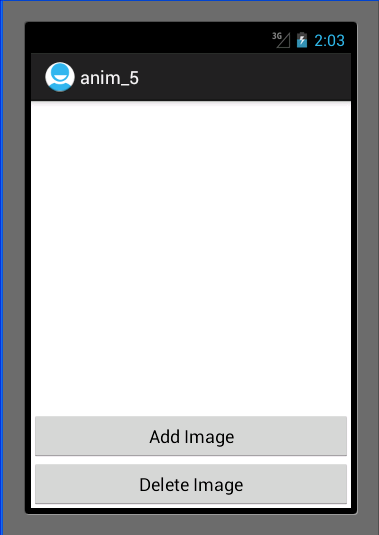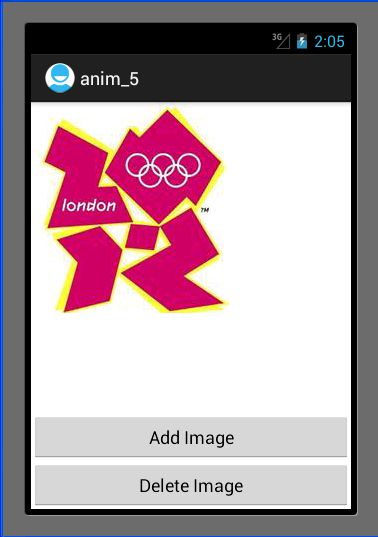Android开发历程_11(AnimationListener的使用方法)
AnimationListener听名字就知道是对Animation设置监听器,说简单点就是在Animation动画效果开始执行前,执行完毕和重复执行时可以触发监听器,从而执行对应的函数。这种模式在实际运行过程中应该还是蛮有用的。
参考资料为Mars老师的教程,http://www.mars-droid.com/.
开发环境为android4.1.
AnimaitonListener的使用方法主要是在Animation上设置一个监听器,即采用Animation的方法成员setAnimationListener().其参数就是监听器的函数。
现在来说说本次实验的功能,主要有2个按钮,一个是增加图片的按钮,一个是删除图片的按钮,还有一个ImageView的控件,用来显示图片的。当增加图片的按钮按下时,图片会以无到全尺寸的尺寸大小变化出现,而删除按钮按下时,图片会从全尺寸到0尺寸逐渐退出,最后删除掉。
程序界面如下:

增添图片后如下:

这里值得一提的是ViewGroup这个控件,感觉就是Layout控件一样,本次实验的图片控件ImageView里面的图片的增加和删除就是采用的ViewGrop中的addView()和removeView()方法。这2种方法里面传入的参数就是ImageView.
另外,Mars老师资料中在增加图片监听器函数中,重新定义了一个ImageView,重新把这个ImageView加入到ViewGroup中,这样会导致一个问题,那就是当我们把图片删除后且又重新加载后就删除不掉了,因为我们在删除的时候删的是布局文件中的ImageView,但是增加按钮增加的是另外一个ImageView,所以我们虽然删除掉了布局文件中的ImageView,但是屏幕上还是会显示图片的。因此解决的方法就是在增加按钮函数中直接使用布局文件中的ImageView,这样程序中可以一直增加图片和删除图片,且在屏幕中还能看到效果。
程序主要代码如下:
MainActivity.java:
package com.example.anim_5; import android.app.Activity; import android.os.Bundle; import android.view.Menu; import android.view.View; import android.view.View.OnClickListener; import android.view.ViewGroup; import android.view.ViewGroup.LayoutParams; import android.view.animation.Animation; import android.view.animation.Animation.AnimationListener; import android.view.animation.ScaleAnimation; import android.widget.Button; import android.widget.ImageView; public class MainActivity extends Activity { private Button add = null; private Button delete = null; private ViewGroup viewgroup = null; private ImageView imageview = null; @Override public void onCreate(Bundle savedInstanceState) { super.onCreate(savedInstanceState); setContentView(R.layout.activity_main); add = (Button)findViewById(R.id.add); delete = (Button)findViewById(R.id.delete); imageview = (ImageView)findViewById(R.id.image); viewgroup = (ViewGroup)findViewById(R.id.main_layout); add.setOnClickListener(new AddOnClickListener()); delete.setOnClickListener(new DeleteOnClickListener()); } private class AddOnClickListener implements OnClickListener{ public void onClick(View v) { // TODO Auto-generated method stub //数字后面必须全部加f,否则报错 ScaleAnimation animation = new ScaleAnimation(0.0f, 1.0f, 0.0f, 1.0f, Animation.RELATIVE_TO_SELF, 0.5f, Animation.RELATIVE_TO_SELF, 0.5f); animation.setStartOffset(500); animation.setDuration(1000); // ImageView image_add = new ImageView(MainActivity.this); // image_add.setImageResource(R.drawable.london_olympic); // viewgroup.addView(image_add, new LayoutParams(LayoutParams.WRAP_CONTENT, LayoutParams.WRAP_CONTENT)); // image_add.setAnimation(animation); //还是直接用布局文件中的ImageView比较好,否则加入的图片用后面的方法视觉上是删不掉的 //这里是采用setImageResource方法加载图片到ImageView控件上的。 imageview.setImageResource(R.drawable.london_olympic); //用ViewGroup将ImageView加载到activity中 viewgroup.addView(imageview, new LayoutParams(LayoutParams.WRAP_CONTENT, LayoutParams.WRAP_CONTENT)); //启动ImageView的Animation imageview.startAnimation(animation); } } private class DeleteOnClickListener implements OnClickListener{ public void onClick(View v) { // TODO Auto-generated method stub ScaleAnimation animation = new ScaleAnimation(1.0f, 0.0f, 1.0f, 0.0f, Animation.RELATIVE_TO_SELF, 0.5f, Animation.RELATIVE_TO_SELF, 0.5f); animation.setStartOffset(500); animation.setDuration(1000); //设置AnimationListener animation.setAnimationListener(new DeleteAnimationListener()); imageview.startAnimation(animation); } } private class DeleteAnimationListener implements AnimationListener{ public void onAnimationEnd(Animation animation) { // TODO Auto-generated method stub viewgroup.removeView(imageview); } public void onAnimationRepeat(Animation animation) { // TODO Auto-generated method stub } public void onAnimationStart(Animation animation) { // TODO Auto-generated method stub } } @Override public boolean onCreateOptionsMenu(Menu menu) { getMenuInflater().inflate(R.menu.activity_main, menu); return true; } }
activity_main.xml:
<RelativeLayout xmlns:android="http://schemas.android.com/apk/res/android" xmlns:tools="http://schemas.android.com/tools" android:id="@+id/main_layout" android:layout_width="match_parent" android:layout_height="match_parent" > <Button android:id="@+id/delete" android:layout_width="fill_parent" android:layout_height="wrap_content" android:layout_alignParentBottom="true" android:text="Delete Image" /> <Button android:id="@+id/add" android:layout_width="fill_parent" android:layout_height="wrap_content" android:layout_above="@+id/delete" android:text="Add Image" /> <ImageView android:id= "@+id/image" android:layout_width="wrap_content" android:layout_height="310dip" android:src="@drawable/london_olympic" /> </RelativeLayout>
总结:通过本次实验,可以了解到AnimationListener的基本使用方法。